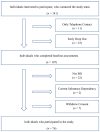Perceived Criticism and Family Attitudes as Predictors of Recurrence in Bipolar Disorder
- PMID: 36397748
- PMCID: PMC9667347
- DOI: 10.32872/cpe.4617
Perceived Criticism and Family Attitudes as Predictors of Recurrence in Bipolar Disorder
Abstract
Background: Bipolar disorder (BD) is a highly recurrent psychiatric condition. While combined pharmacological and psychosocial treatments improve outcomes, not much is known about potential moderators that could affect these treatments. One potential moderator might be the quality of interpersonal relations in families, for example, familial attitudes and perceived criticism.
Method: To explore this question we conducted a post-hoc analysis that used an existing data set from a previous study by our group that compared cognitive behavioral therapy (CBT) and supporting therapy (ST) in remitted BD. In the present study, we used Cox proportional hazard models.
Results: We found that the relatives' ratings of criticism predicted the likelihood of depressive recurrences, especially in the ST condition. The patients' ratings of negative familial attitudes predicted the risk of recurrences in general, irrespective of the therapy condition.
Conclusion: These results suggest that it might be important to assess perceived criticism and familial attitudes as potential moderators of treatment outcome in BD.
Keywords: bipolar disorder; cognitive behavioral therapy; expressed emotion; family; illness course; perceived criticism; psychotherapy.
Conflict of interest statement
The authors have declared that no competing interests exist.
Figures


Similar articles
-
Cognitive deficits in bipolar disorders: Implications for emotion.Clin Psychol Rev. 2018 Feb;59:126-136. doi: 10.1016/j.cpr.2017.11.006. Epub 2017 Nov 21. Clin Psychol Rev. 2018. PMID: 29195773 Free PMC article. Review.
-
Symptoms, course of Illness, and comorbidity as predictors of expressed emotion in bipolar disorder.Psychiatry Res. 2019 Jun;276:12-17. doi: 10.1016/j.psychres.2019.03.049. Epub 2019 Mar 30. Psychiatry Res. 2019. PMID: 30981096
-
Perceived criticism from family members as a predictor of the one-year course of bipolar disorder.Psychiatry Res. 2005 Sep 15;136(2-3):101-11. doi: 10.1016/j.psychres.2005.04.005. Psychiatry Res. 2005. PMID: 16023735
-
Influence of expressed emotion and perceived criticism on cognitive-behavioral therapy for social phobia.Behav Res Ther. 2007 Feb;45(2):235-49. doi: 10.1016/j.brat.2006.03.002. Epub 2006 Apr 25. Behav Res Ther. 2007. PMID: 16635478
-
Towards personalising treatment: a systematic review and meta-analysis of face-to-face efficacy moderators of cognitive-behavioral therapy and interpersonal psychotherapy for major depressive disorder.Psychol Med. 2019 Dec;49(16):2657-2668. doi: 10.1017/S0033291719002812. Epub 2019 Oct 16. Psychol Med. 2019. PMID: 31615583
References
-
- Basco, M., & Rush, A. (1996). Cognitive-behavioral treatment of manic depressive disorder. Guilford.
LinkOut - more resources
Full Text Sources
